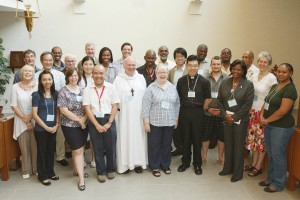For more photos, see the Diocese’s Facebook page.

By Henrieta Paukov
The first weekend in June found Bishop Linda Nicholls and her guests, the Rev. Monique Campbell from Jamaica and Mr. K. C. Hui from Hong Kong, in the Parish of Belmont in the countryside outside Peterborough, accommodated comfortably though somewhat unconventionally.
“We were each hosted by a different family — on a horse farm, a dairy farm and a home out in the country — and had an opportunity to experience life there,” says Bishop Nicholls. “One of my guests was particularly delighted to be able to visit the petroglyphs near Peterborough and get a sense of native spirituality. We worshiped with our hosts on Sunday morning.”
It was all part of learning about each other, which was the goal of the Continuing Indaba Process in which the three were participating from May 31 to June 7, with 14 other delegates from the Diocese of Jamaica and the Cayman Islands and the Diocese of Hong Kong Island, and seven from the Diocese of Toronto. Other dioceses around the world were also meeting in groups of three or four to hold discussions. The Continuing Indaba Process was organized by the Anglican Communion office in London in an effort to identify helpful ways of conducting difficult conversations within the Communion.
What made this gathering different from other international gatherings was its focus on listening, rather than decision-making, explains Bishop Nicholls. “It’s called Continuing Indaba — continuing conversation — because we are not in the same place and we need to listen to each other,” she says. We may have differences on certain issues, but we are committed to staying at the table together under Christ, and in order to do that, we need to listen closely because we each learn from the other.”
On the first day, the local group – which included Canon Robert Falby, the Rev. Canon Stephen Fields, the Rev. Dan Graves, Christian Harvey, Suzanne Lawson, the Rev. Heather McCance, and Peter Tovell – made a presentation to the other two groups about the Diocese of Toronto and the Anglican Church of Canada. The next day, the visitors toured Toronto neighbourhoods and visited Holy Trinity, Trinity Square, for a Eucharist. Afterward, some visited All Saints, Sherbourne St., an outreach ministry in downtown Toronto, while others went to Flemingdon Park Ministry, which serves a multicultural neighbourhood that is home to many new Canadians. “It was good to hear our clergy talk passionately about their ministries,” says Bishop Nicholls.
In the evening, the participants heard from a panel of local Anglicans engaged in social justice and advocacy. “There was some very interesting dialogue there,” says Bishop Nicholls, “It opened our eyes to the issues that have arisen from colonialism in Jamaica and some of the concerns about issues that are not being addressed around development and global financing.”
On Thursday morning, the group discussed the involvement of youth in church life. “With the Hong Kong community, youth is very much a part of their church,” says Bishop Nicholls. “It raises a question for me: ‘How have they done that?’ Now, part of it is that the church has an ongoing relationship with young people because it runs so many of the schools in the country.”
Similarly, in Jamaica, faith is much more a part of daily life than it is in Canada. “It’s talked about, it’s referred to, it’s just a lively part of everything,” says Bishop Nicholls. “As Canadians, we keep our religion closely sequestered and we don’t talk about our faith, we don’t name Jesus regularly. And so it’s been delightful to hear about that and to wonder: ‘What would it take for our people to feel so comfortable with their faith that it’s part of every day?’”
On Thursday afternoon, each Canadian member took one Hong Kong member and one Jamaican member to his or her own church for the weekend. Bishop Nicholls chose the Parish of Belmont in her episcopal area of Trent-Durham, so that the visitors could experience a rural parish.
On Monday, the group discussed the topic of human sexuality. “That was a more difficult time, because each diocese is in such a different place in its conversations around homosexuality,” says Bishop Nicholls. “For instance, in Jamaica, male homosexual practice is illegal, and so to even have a conversation is difficult for some people.”
Some of the visitors questioned whether Canadian Anglicans are trying to impose their views on others. “We tried to be clear that we are not asking others to be where we are, we are just trying to share what our diocese has come to,” says Bishop Nicholls. “And, of course, our diocese is not united on where we stand, so we tried to share some of the differences within our own group. It was a challenging evening, but I also believe that there has been enough development of personal relationships that we could hear one another. The listening has to be really intense at this point.”
The listening and dialogue will continue in September, when the same group meets in Hong Kong, and in February 2012, when they meet in Jamaica. “The idea is to deepen the conversation and to understand the context of that conversation by going to the other diocese,” says Bishop Nicholls. “One of the key things is that nobody can come into the conversation and not be changed, because you learn something new about the other.”